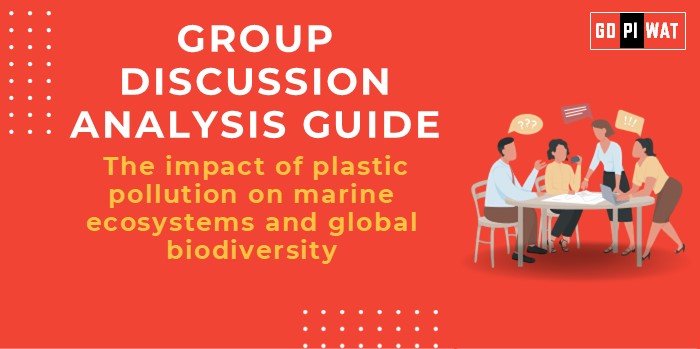🌊 Group Discussion Analysis Guide
Plastic Pollution and Biodiversity
🌐 Introduction to the Topic
Opening Context: Plastic pollution has become a global crisis, with an estimated 12 million tons of plastic entering oceans annually, severely affecting marine ecosystems and global biodiversity. Its relevance for B-school students lies in its implications for sustainability and policy innovation.
Topic Background: Since the advent of mass plastic production in the mid-20th century, global reliance on plastic has surged. Mismanagement of plastic waste has resulted in its pervasive presence in marine environments, threatening species and ecosystems.
📊 Quick Facts and Key Statistics
- Plastic Waste Generation: 400 million tons annually – highlights scale and urgency.
- Marine Debris: 80% of ocean debris is plastic – illustrates dominance.
- Species Impact: Over 700 marine species affected by plastic ingestion or entanglement – underscores biodiversity crisis.
- Microplastic Pollution: Found in 90% of marine species studied – showcases widespread contamination.
- Economic Impact: $13 billion annual cost to marine industries – reflects economic strain.
👥 Stakeholders and Their Roles
- Governments: Regulate plastic production and waste management policies.
- Industries: Innovate in sustainable packaging and production.
- NGOs and Researchers: Raise awareness and develop alternatives.
- Citizens: Reduce plastic use and participate in recycling initiatives.
🎯 Achievements and Challenges
- Achievements:
- Policy Success: EU’s Single-Use Plastics Directive has banned key items like straws and cutlery.
- Corporate Action: Companies like Unilever have committed to 100% recyclable packaging by 2025.
- Innovations: Biodegradable plastics and advanced recycling technologies.
- Challenges:
- Lack of infrastructure for waste management in developing countries.
- Rising microplastic contamination in marine food chains.
- Global Comparisons:
- Success: Norway recycles 97% of its plastic bottles.
- Challenge: India faces severe waste segregation issues.
🌍 Case Studies
- The Great Pacific Garbage Patch: A stark reminder of mismanagement.
- Kerala, India: Effective coastal clean-ups through local NGO partnerships.
💬 Structured Arguments for Discussion
- Supporting Stance: “Bans and regulations on single-use plastics are essential for reducing ocean pollution.”
- Opposing Stance: “Economic reliance on plastics in developing nations complicates transition to alternatives.”
- Balanced Perspective: “While bans help, holistic solutions involving waste management and education are vital.”
🎯 Effective Discussion Approaches
- Opening Approaches:
- Start with a compelling statistic about marine species affected.
- Pose a thought-provoking question about the future of marine biodiversity.
- Counter-Argument Handling:
- Example: “Though transitioning is costly, investments in alternatives can create long-term benefits for economies and ecosystems.”
📈 Strategic Analysis of Strengths and Weaknesses
- Strengths: Global awareness, emerging technologies, international agreements.
- Weaknesses: Cost of alternatives, inadequate waste management systems.
- Opportunities: Circular economies, public-private collaborations.
- Threats: Continued dependency on plastics, climate change impacts.
🏫 Connecting with B-School Applications
- Real-World Applications: Sustainable operations, global policy frameworks, and corporate social responsibility initiatives.
- Sample Interview Questions:
- “How can businesses contribute to solving marine plastic pollution?”
- “Evaluate the economic impacts of reducing plastic use globally.”
- Insights for B-School Students:
- Engage in sustainability-focused projects.
- Explore cross-sectoral collaborations for environmental challenges.


